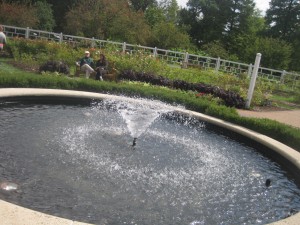
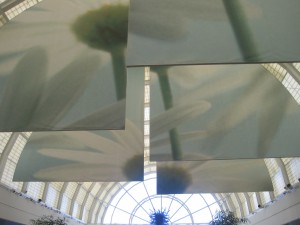
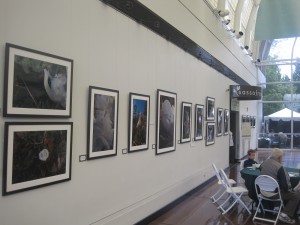
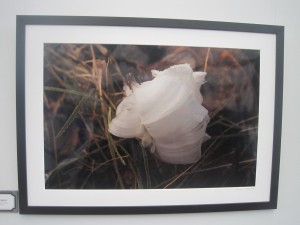
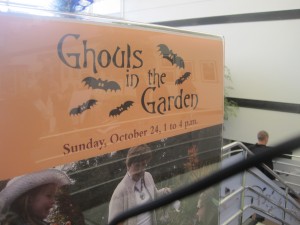
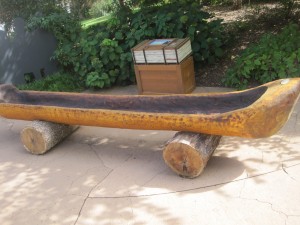
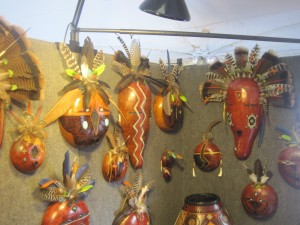
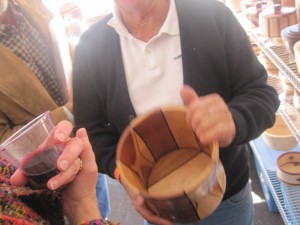
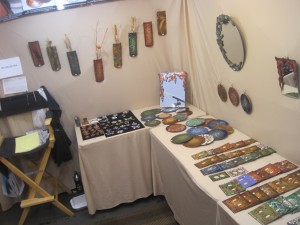
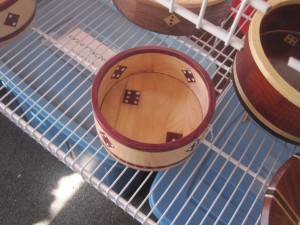 Photos from a visit to the Missouri Botanical Garden, St. Louis.
Photos from a visit to the Missouri Botanical Garden, St. Louis.
Fall, 2010
It is night in a once noisy village, and the cool wind of the evening blows around the rest of the dust floating around the sky. During the day, the bustle of the street rivals that of many small markets around Ibadan. Children racing with used car wheels from baale’s house downhill towards Mama Lawyer’s clinic at the end of the street, young girls hawking vegetables scream the price of their wares on the top of their lungs, children run around bare-feet without any care in the world, and loud music plays from the many rooms around the street. Now, at night, everything is quiet, except for the little transistor radio in father’s hands as he paces around the house looking for the signal for the Voice of America.
The concrete slab that extends from the front door of the house bends towards the sand at a steep angle. It goes on for a few metres and is suddenly cut off, leaving a ledge where water drips down into the open field when it rains. The field has grandmother’s garden of vegetables. It had garden eggs, yanrin, and spinach. Farther down a few metres on is the well for water. All the other parts of the compound has different crops, depending on the time of the year. Maize grew in April. We planted them in March. Cassava grew many times during the year, as did coco-yam. As soon as the rain fell, we went out with hoes and made heaps. We got loam from two houses away where the chicken farmer dumped the waste from the poultry. They told us that the soft black dung when mixed with the soil in our compound made the corn come out bigger and stronger. They gave us buckets and seeds. We were six, and seven, and ten. We fancied ourselves as brilliant farmers who knew just what the land wanted, and gave it to it. We treasured millipedes and centipedes, and the little white worm that surprises us from within the dung. They called it ogongo. Ogongo was another name for ostrich, but I’d never seen an ostrich before.
Behind mother’s window north of the house was a large guava tree. Underneath is was the softest soil around the house. Two plots for a house compound was large enough for any kind of play, and we ran around to the best of our strength. When raining season came, we settled on that spot behind her window for the site of the corn and beans garden. The soil is heaped in serrated ridges and space is put in-between them for walking. Corn is planted in twos and threes. Olaolu said he had been told that planting them in threes made the odds more favourable for the seeds. I looked at the small black bed of soil and smiled in contentment. It always took two to five days for the first leaf to sprout out of the heap, and all that would be left is the need to add water, or just wait for the rain to pick up. But there I was just smiling at the result of my accomplishment. Mother looked out of her room through a striped red curtain and giggled. “Kola, you won’t be standing there forever, would you? It doesn’t start growing as soon as you plant it, you know.”
Night. We lay on mats on the concrete slab just a few feet away from the front door. It’s quiet and the evening breeze blows around the village tossing up the remaining dust left of the children’s running feet. There usually is no electric light. If there is, it would have been put off deliberately. What lights the evening is the moon and the cheer in our voices as we talk about whoknowswhat, mostly in hush and sometimes excited tones. Father is still pacing around the house this time with his little transistor close to his ears. Occasionally, the words Tamil Tiger rebels or Bosnia Herzegovina will assail my ears as the others giggle at his strange hobbies. Mostly, when he comes around in those heavy paces holding the radio to his ears, those giggling a few minutes earlier would have relapsed into a mode of pretend-sleep. The front porch had its charm, especially when it rained. It was the best place to sit and watch the lightening rip the blackness of the village sky into shreds, and give certain shivers needed for a good night sleep. But those were the days.
WAAW is pleased to announce its 2014 scholarships, offering $500/year for need-based female African students admitted to a University, College or institute of higher learning in Africa. WAAW Foundation is a U.S. based non-profit organization focused on Working to Advance STEM Education for African Women. WAAW promotes Science and Technology education among African girls, and works to ensure they are engaged in technology innovation for Africa.
Eligibility: Female students of African origin living in Africa, less than 32 years, have gained Undergraduate admission to a University or College in Africa and studying a Science, Technology, Engineering or Math (STEM) related degree course. Candidates must demonstrate financial need and excellent academic record. Special consideration is given to underprivileged students such as orphans, girls impacted by HIV or students in first or second year of study.
*Please note that WAAW does not fund graduate (masters, MBA or phd) programs, second or subsequent degrees, students older than 32 years, non-STEM focused courses or Diploma degrees.
Benefits: Scholarship recipients receive an award of $500 for the 2014 academic year, or the equivalent in their country’s local currency. Prior scholarship recipients may reapply for renewal the following year, with proof of continued excellent academic performance.
The Application Process: WAAW will accept online applications from September 1 through November 30, 2013. Applications submitted prior to this date will not be received or reviewed. Scholarship applications are reviewed by the WAAW foundation Scholarship Committee, and awards are announced by February 2014. Application deadline is 12 midnight of November 30th, 2013. Instructions on how to apply are below.
How to Apply: Visit the WAAW foundation web site at http://www.waawfoundation.org/scholarships and complete the application form online. Follow the application instructions carefully. You must finish your application in one sitting. You will be required to write essays on your future career goals and how you expect the WAAW scholarship will assist in fulfilling those goals. We also require two letters of recommendation, from academic mentors and or job supervisors. Only shortlisted candidates will be required to mail current University transcripts directly to WAAW Foundation by November 30, 2013. Application documents must be submitted electronically via our online forms. We will not be accepting paper applications this year. All applicants are strongly encouraged to follow us on Facebook at: http://www.facebook.com/waawfoundation.
Examples of courses that are not eligible to apply: Nursing, ICT, diploma, mass communication, Social Sciences, Accounting, Business administration, Economics, Education. etc
Please email Unoma@waawfoundation.org for partnership and sponsorship opportunities.
_________
ABOUT WAAW FOUNDATION
WAAW (Working to Advance STEM education for African Women) Foundation is a US based non-profit organization whose mission is to increase the pipeline of African girls in Science, Technology, Engineering and Math (STEM) and Computer Science (CS) related fields, and work to ensure that this female talent is engaged in technology innovation for Africa.
HISTORY
In January 2007, while working to obtain her Ph.D. in electrical and computer Engineering at the Texas A & M University, Dr. Unoma Ndili Okorafor, moved by passion, a personal awareness of the huge technological and digital divide between Africa and many developed nations, and the recognition that female education as well as technology innovation play a crucial role in economic development and poverty alleviation of any nation, founded WAAW foundation. WAAW is a non-profit tax exempt 501(c) organization (EIN 20-8576703) incorporated in the state of Texas, U.S.A., on the 5th of January 2007, and registered with the Corporate Affairs Commission of Nigeria.
Our Vision
To train and engage women leaders who contribute to technology and economic growth in Africa. To become the premier international partner of choice within a global movement dedicated to ending poverty in Africa through female education.
Strategic Direction
WAAW Foundation believes that female educations along with technology innovation are two key drivers that will accelerate economic development and alleviate poverty in Africa. One of our over arching goals is to bridge the technology innovation gap between Africa and developed nations, by lessening the disparity between the number of African girls versus boys entering STEM fields. Our strategy is to:
(a) Engage African girls in the process of promoting STEM education at all stages.
(b) Build a sustainable and connected community that empowers girls in STEM to help themselves and each other via peer-to-peer mentoring.
(c) Build a repository of localized STEM resources that employ locally available, low cost resources to promote STEM education and innovation.
(d) Build an ever-increasing pipeline of women leaders in STEM through a feed forward process.
(e) Focus on sub Saharan Africa to build critical mass.
(f) Engage international partners and bring significant value to our partners and funders.
This sensual combination of soul and traditional African beats is what’s moving my legs this Sunday.
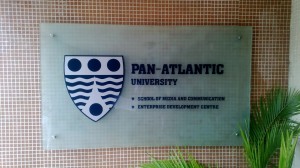 A few days ago, the Pan-Atlantic University, Nigeria, (formerly known as the Pan-African University) had a press conference to announce the introduction of three undergraduate courses into its school system from 2014. The event took place at the Victoria Island campus of the school, and was open to the press and other invited guests.
A few days ago, the Pan-Atlantic University, Nigeria, (formerly known as the Pan-African University) had a press conference to announce the introduction of three undergraduate courses into its school system from 2014. The event took place at the Victoria Island campus of the school, and was open to the press and other invited guests.
Present at the event representing the school were Mrs. Rosemary Okolo (Registrar), Dr. Chidi Nwagu (Manager, External Relations), Professor Emevwo A. Biakolo (Dean of the School of Media and Communication), and Professor Chantal Epie, the Deputy Deal of the School of Business Administration.
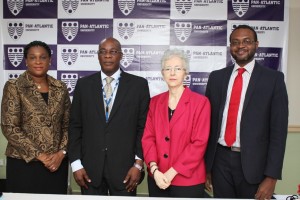
According to a press release given at the event, the Pan Atlantic University has been a graduate university for eleven years, offering postgraduate programmes exclusively. Now, it intends to extend its activities to eventually become a full-service university that will also offer first-degree programmes. For now, the three new initial courses are in professional fields: business and mass communication. They are B.Sc in Mass Communication, B.Sc in Business Administration, and B.Sc in Accounting. In 2015, the school hopes to include three new programmes: Masters degree in Film Making, B.Sc. Mass Communication (with options), and B.Sc. in Information Science and Media Studies.
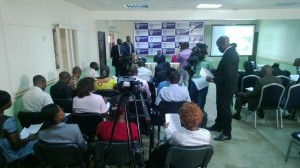 The University boasts of international relationships with many universities around the world, like the University of Central Lancashire, University of London, University of Portsmouth, University of Navarra, as well as organizations like the Guaranty Trust Bank, Gesellschaft fur Konsumforschung (GFK), the USA Chambers of Commerce, and the Nigerian Guild of Editors, among others, and currently offers training in Written and Spoken Communication, Digital Media and Communication, Relationship Management, Development Communication, Corporate Affairs, Community Relations, Photography, Film and Entertainment, Animation, Media Business and Enterprise Management, Research, Multimedia Journalism, Radio and Television, and Internet and Online Studies.
The University boasts of international relationships with many universities around the world, like the University of Central Lancashire, University of London, University of Portsmouth, University of Navarra, as well as organizations like the Guaranty Trust Bank, Gesellschaft fur Konsumforschung (GFK), the USA Chambers of Commerce, and the Nigerian Guild of Editors, among others, and currently offers training in Written and Spoken Communication, Digital Media and Communication, Relationship Management, Development Communication, Corporate Affairs, Community Relations, Photography, Film and Entertainment, Animation, Media Business and Enterprise Management, Research, Multimedia Journalism, Radio and Television, and Internet and Online Studies.
More here.
_____________
CORRECTION: The earlier version of this post lists the three new undergraduate courses as B.Sc in Banking and Finance, Industrial Relations and Personnel Management, and Marketing. Mistake has been fixed. The error is regretted.
_____________
Photos by KTravula.